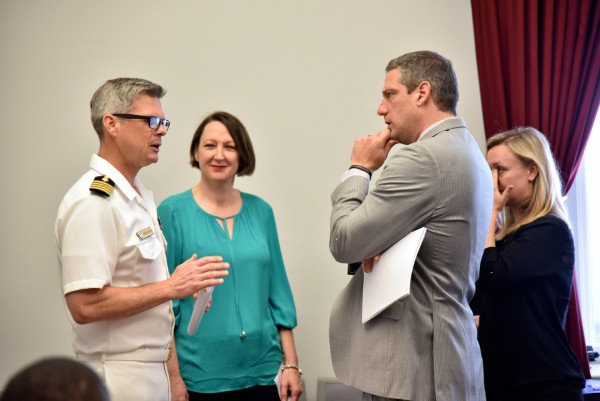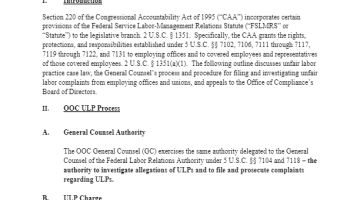I. Introduction
Section 220 of the Congressional Accountability Act of 1995 (“CAA”) incorporates certain provisions of the Federal Service Labor-Management Relations Statute (“FSLMRS” or “Statute”) to the legislative branch. 2 U.S.C. § 1351. Specifically, the CAA grants the rights, protections, and responsibilities established under 5 U.S.C. §§ 7102, 7106, 7111 through 7117, 7119 through 7122, and 7131 to employing offices and to covered employees and representatives of those covered employees. 2 U.S.C. § 1351(a)(1). The following outline discusses unfair labor practice case law, the General Counsel’s process and procedure for filing and investigating unfair labor complaints from employing offices and unions, and appeals to the Office of Compliance’s Board of Directors.
II. OOC ULP Process
A. General Counsel Authority
The OOC General Counsel (GC) exercises the same authority delegated to the General Counsel of the Federal Labor Relations Authority under 5 U.S.C. §§ 7104 and 7118 – the authority to investigate allegations of ULPs and to file and prosecute complaints regarding ULPs.
B. ULP Charge
i. Who can file? “Any person” can file a charge alleging that an employing office, employing activity, or labor organization has engaged in an unfair labor practice with the OOC GC. (2 U.S.C. § 1351(c)(2) ; OOC Reg. 2423.3)
ii. Timely filing of ULP charge. A ULP charge must be filed within 180 days of the occurrence of the alleged unfair labor practice. (2 U.S.C. §1351(c)(2))
Note: While the FSLMRA Statute (“Statute”) provides for exceptions to the 180 days (6 months) rule under § 7118(a)(4), §7118’s incorporation into the CAA is limited by the 2 U.S.C. §1351(c)(2) language “except as otherwise provided in this section”. §1351(c)(2) does not explicitly provide for any exceptions to the 6-month rule and the Board has not directly addressed whether there are any exceptions to the 180-day rule codified under Part D of the CAA. However, the Board’s decision in Perez v. Office of Rep. Sheila Jackson-Lee may shed light on how it might rule on this issue.

